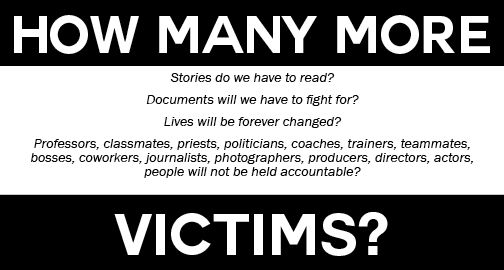Front Page Editorial: How Many More?

Online hedder
January 25, 2018
More than 160 women accused USA Gymnastics team doctor Larry Nassar of sexual abuse. These voices would have been silenced if not for the IndyStar’s reporting.
Because these stories were brought to light, Nassar will spend up to 175 years in prison for his crimes.
Jerry Sandusky’s crimes at Penn State would not have been revealed without the work of a 24-year-old journalist at a small Pennsylvania paper, The Patriot-News.
Student newspaper UWM-Post recently reported that 37 professors and staff members at the University of Wisconsin-Milwaukee were accused of sexual assault and harassment in the past five years, but little else is known because the university will not hand over documentation.
And then there is the Kentucky Kernel, which prevented former UK professor James Harwood from moving on to other universities without anyone knowing of his predatory behavior on our campus. The Kernel exposed this not by obtaining official records provided by UK, but through its own reporting. In fact, more than a year later, UK is still fighting to keep those records private.
The #MeToo movement has emphasized that complicity in this kind of secrecy leads to tragedy.
Universities that protect incriminating documents protect perpetrators.
People who ignore accusations enable the accused.
Shaming victims who speak out frightens others into continued silence.
When politicians are more concerned with gaining power than listening to those made powerless, when Hollywood continues to make blockbusters instead of facing the reality of sexual harassment in the industry, and when universities protect their reputations under the false flag of protecting students’ privacy, declarations of “me too” will continue.
In her testimony against Nassar, Olympic gymnast Aly Raisman said, “My dream is that one day, everyone will know what the words ‘me too’ signify, but they will be educated and able to protect themselves from predators like Larry, so that they will never, ever, ever have to say the words, ‘me too.’”
It is not only sexual abusers who contribute to this problem. It is not only victims who should care. It is not only journalists who should tell victims’ stories.
To the university official who hears a student’s complaint, to the boss who knows what happens in the breakroom, to the movie director who sees the abuse behind the scenes, to anyone who could amplify the voices of victims, do not be complicit any longer.
How many more stories have yet to be told?
How many more times will we look away?
Until universities quit spending money to keep their secrets, until the names of abusers are left off movie credits and election ballots, until we all realize the harm we have done and the healing we can do, there will be more.































































































































































